Turns out my “I’m feeling better!” celebrations from the last post were a little premature. I thought I was basically cured, but as we know by now Pakistan is full of surprises. Instead of that 100% recovery I was expecting, I had a little relapse. It turns out that having a stomach bug for six straight days is the best way to become dangerously dehydrated and get people really concerned. This is how I found myself at one o’clock in the morning last night being hurtled toward the emergency room of Shifa Hospital in downtown Islamabad with an entourage of four: my driver, my boss, my colleague (and acting translator), and our security chief. Overkill? Maybe. But it was really nice of all of them to come to the ER with me. And know we all know how to get there for next time!
So, What is the Emergency Room Like in Pakistan?
Pretty much like in America, except that it is way better. This particular ER had the huge plus of no waiting. I was ushered right in immediately to my little curtained-off bed and saw the doctor within 3 minutes. When I went to Boston Medical Center in 2001 with what turned out to not be appendicitis, I waited for six hours in the ER with no water or pain meds before anything happened to me, unless you count being poked by med students on their first day of school “anything.” Granted, BMC is in Dorchester, and it is hard to pay much attention to the girl with the tummyache when all the gunshot victims are being wheeled by on gurneys. Advantage: Pakistan.
What’s the one thing you have to do a bunch of when you show up to an American ER? Fill out a form. Fill out another form. Sign stuff. Show them your insurance card, if you have one. What do you have to do at the ER in Islamabad? Show up. Have your colleague Kashif explain to the staff in Urdu what your symptoms are. Go lay on the little bed and get treated. I didn’t ever touch a pen, a form, or have any conversation with anyone about a financial transaction of any kind. (Come to think of it, who paid for my visit to the ER and all those antibiotics? I certainly didn’t pony over any cash. Maybe it was someone in my entourage.) Advantage: Pakistan.
Because I had been drinking water like a fiend all day, I was on a strict peeing-every-2o-minutes schedule, meaning three times in the course of my adventure at the Pakistani ER. The bathroom was just off the main room, quite clean, and well-stocked with germ-killing soaps, but the room was stripped of paper products of any kind, as if toilet paper and paper towels were dangerous implements and we were all on suicide watch. I mean, no paper products whatsoever. Not in the stalls, not on the counters, not even in the huge storage closet that one might be tempted to root around in were one on a dedicated hunt for toilet paper. I found this a little odd. Advantage: U.S.
It may be that the key to a good ER experience is going to the hospital in the wee hours. The last time I did this was after a night out at the Rum Line in Beverly, MA, and I had an entourage that time too. (Although this time instead of colleagues and security professionals, it was a bunch of scantily-clad girls ripped away from their whisky sours–some of whom started crying when they came in and saw me hooked up to an IV. Ahhh, Boston in your 20s.) I realize it’s starting to sound a bit like I make a habit of going to the ER. Anyway, the staff demeanor in the middle of the night was so great in both Beverly and Islamabad: it’s almost like everyone is happy you came in because it gives them something to do. In Beverly, they put me in a wheelchair to bring me in from the car (plus), but they also gave me overzealous ex-rays and I’m not crazy about the unnecessary radiation (minus). Advantage: Push.
But back to Pakistan. Upon my arrival, the doctor immediately wanted to stick me with an IV to get my fluid levels up. I hate needles, even the tiny little IV kind. I suggested maybe he should check my blood pressure first, and if it was okay, he could possibly consider not giving me the IV. I told him I had been very, very good at drinking lots of water and taking lots of mineral-packed salts and sugar to replace what I was losing and that I could basically promise him I wasn’t dehydrated. (Does it sound like I was begging a little? I guess that comes across in both English and Urdu.) He said he would give it a try, checked my blood pressure, found it fine, and said no IV. I really like people who will hear out your argument on why that needle is unnecessary and who are also responsive to a little begging. Advantage: Pakistan.
They are nothing if not thorough at the ER in Islamabad (and, apparently, needle-happy). After the aborted IV, and the symptom check, and the antibiotics were prescribed, I figured it was time to go home. Instead the nurse pulled out large vials that he intended to fill with my blood, so I urgently had Kashif communicate the crucial information that my veins are the size of eyelashes and I have been known to pass out with all but the most expert of blood-takers (and even then sometimes I get a little woozy). The vials were put away. Some people might say the ER should tell the patient to shut up and do the blood draw. I am not one of these people. Advantage: Pakistan.
Then I really did get to go home, all fixed up with a prescription for Cipro (so much for my attempts to avoid antibiotics in Pakistan) and a bottle of nasty Pedialyte that I didn’t drink (don’t tell the doctor; he already thinks I’m difficult). I do, finally, feel much better today. All in all, going to the hospital in Islamabad in the middle of the night was much less unpleasant than one might expect. It turns out while the food in Pakistan can be very, very scary, the ER really is not. Let’s hear it for surprises!


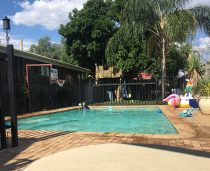
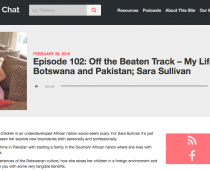
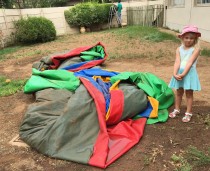
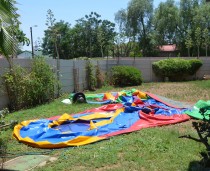
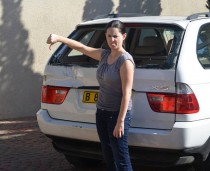

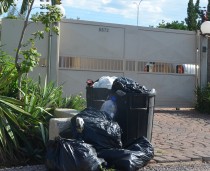
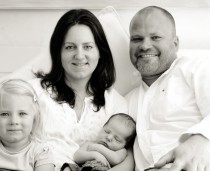
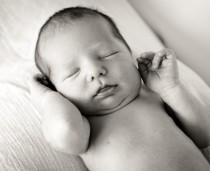
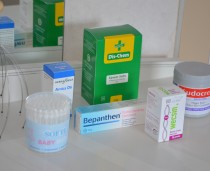
13 Comments